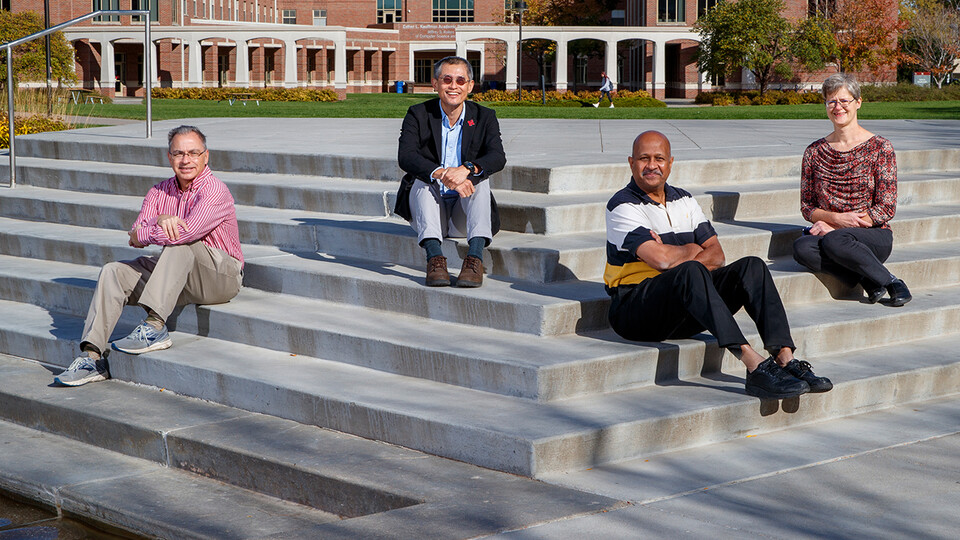Tiffany Lee, January 6, 2021
Nebraska-Citadel collaboration merges sciences to explore social unrest
Social unrest events can take many forms, from demonstrations or protests that signal a vibrant democracy and broad participation in the political process, to riots and coups that threaten security at the local, national and global scales.
Research indicates that social unrest is an important and common phenomenon. However, most of the work has examined the causes of unrest in hindsight. Much less is known about the short-term triggers and long-term factors that precipitate such events – giving governments, policy experts and other decision-makers little opportunity to anticipate them, optimize their positive impact or mitigate their negative effects.
With a grant from the Department of Defense, an interdisciplinary University of Nebraska-Lincoln team is collaborating with researchers at The Citadel to pinpoint long- and short-term predictors of social unrest and develop models that help visualize and anticipate social unrest across space and time. They are leveraging a diverse array of data – socio-demographic, cultural, climatological, infrastructural, geographic and economic, among others – to build models of countries in Western Asia and the Middle East, with the intent to apply similar models elsewhere around the world.
The grant totals just over $1.6 million; Nebraska’s share is about $1.3 million. The Citadel’s principal investigator, Deepti Joshi, received her doctorate in computer science from Nebraska.
The project’s innovative approach merges computer science, which deals in granular, specific data points, with the social sciences, which draws on longer-term, aggregate-level data.
“Our charge is to try to integrate these two approaches and create something actionable on how to anticipate unrest. Ideally this will help mitigate the factors that cause unrest to begin with, and help optimize the consequences of unrest when it does occur,” said Regina Werum, professor of sociology and the team’s leading social scientist.
The project builds on the team’s prior DOD-funded project, which produced an online platform, the Social Unrest Reconnaissance Gazetteer and Explorer, or SURGE, a map-based tool enabling users to visualize social unrest events across time and space. With the new round of funding, the team will expand SURGE by including more detailed data about the causes and evolution of social unrest events and enabling users to model “what if” scenarios by changing parameters within the platform.
The team is focusing on India, Pakistan, Bangladesh, India and Iraq, but expects the resulting algorithms and model to be useful beyond those locations. The countries were selected for characteristics that play a role in social unrest, such as demographics, political dynamics and natural resource shortages. In addition, logistical considerations shaped case selection, such as the existence of English-language newspapers in addition to local language media sources.
Leen-Kiat Soh, University of Nebraska-Lincoln’s principal investigator, said he was initially interested in exploring the causes of social unrest using a data-driven, computational approach. But he realized the breadth of data available was too vast to build an actionable model. He needed a way to narrow the scope of data.
That’s where Werum’s expertise is key, as social scientists are experts in determining the “how” and “why” of events. Soh recruited Werum to identify what he terms the “fuels” of social unrest – the longer-term, background drivers of these events, such as economic inequality, racial divides and uneven access to resources. Pinpointing these fuels enables the computer scientists to focus on certain situations in both time and space that are likely fertile for social unrest.
“The space for exploration is huge,” said Soh, professor of computer science. “Without guidance from social science, it’s finding needles in a haystack.”
Soh’s group focuses on finding the “triggers,” or the short-term factors, that provoke social unrest. For example, Werum’s team has identified a wide gap between the rich and poor as a long-term factor driving social unrest. But this disparity alone isn’t enough: There must be a trigger, or short-term precipitating event, that sparks the discord — for example, mass layoffs, a natural disaster or a change in political leadership.
To identify triggers, the computer scientists are using information from at least 5 million newspaper articles, with more published every day. Ashok Samal, professor of computer science and an expert in spatial data mining, said they mine the articles for the five W’s of the unrest event: what, where, who, when and why. That data is then fed into the team’s model to help paint a more detailed picture of unrest patterns across time and space.
Though other U.S. research teams are also analyzing social unrest, Soh said this project incorporates a uniquely broad dataset. In particular, the expanded SURGE platform will include climate and drought data, making the model potentially important for agriculture-focused areas like Nebraska.
Michael Hayes, applied climatologist and professor in the School of Natural Resources, leads this portion of the work. The challenge, he said, is deciphering whether climate events are fuels or triggers, or if it varies on a case-by-case basis. To start with, his team is examining remotely sensed precipitation data from India to try to tie drought to social unrest events. In the future, they hope to analyze other extreme precipitation events, such as floods and extreme heat events.
Ultimately, the team envisions that its algorithms and models could be applicable to countries and states around the world. During a time of ever-increasing economic inequality, racial and socioeconomic divisions, a changing climate and divisive politics, Soh believes teasing out the drivers of social unrest should be a priority.
“UNL faculty are joining forces to investigate one of the most important issues in today’s world,” he said.






